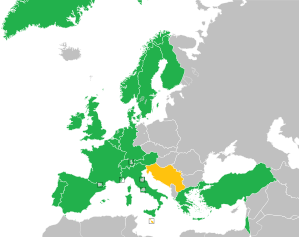Eurovision Song Contest 1978
| Eurovision Song Contest 1978 | |
|---|---|
 |
|
| Dates | |
| Final | 22 April 1978 |
| Host | |
| Venue |
Palais des Congrès Paris, France |
| Presenter(s) |
Denise Fabre Léon Zitrone |
| Conductor | François Rauber |
| Executive supervisor | Frank Naef |
| Host broadcaster | Télévision Française 1 (TF1) |
| Interval act |
Stéphane Grappelli and Oscar Peterson, Yehudi Menuhin, Kenny Clarke, Niels-Henning Ørsted Pedersen |
| Participants | |
| Number of entries | 20 |
| Debuting countries | None |
| Returning countries |
|
| Withdrawing countries | None |
| Vote | |
| Voting system | Each country awarded 12, 10, 8-1 points to their 10 favourite songs |
| Nul points |
|
| Winning song |
"A-Ba-Ni-Bi" |
The Eurovision Song Contest 1978 was the 23rd edition of the annual Eurovision Song Contest. It was held on 22 April 1978 in Paris. The contest was won by Izhar Cohen & the Alphabeta who represented Israel with the song "A-Ba-Ni-Bi". Although 'A-Ba-Ni-Bi' is the correct title, French television mistakenly captioned on screen the song title as 'Ah-Bah-Nee-Bee'. The presenters were Denise Fabre and Léon Zitrone, and this was the first time more than one presenter hosted an edition of the Contest. Twenty countries participated, a record at the time.
The winning entry is a love song sung in the Hebrew equivalent of Ubbi dubbi (the title is an expansion of the Hebrew word ani אני, meaning "I"). This was Israel's first Eurovision win. The win caused problems for several North African and Middle-Eastern nations that were televising the contest, even though they were not participating. According to author and political commentator John Kennedy O'Connor in his book The Eurovision Song Contest: The Official History, when Israel became the clear winners during the voting, most of the Arabic stations ended their transmission of the contest. Jordanian TV finished the show with a photo of a bunch of daffodils on screen, later announcing that the Belgian entry (which finished second) was the winner. Norway finished last for the fifth time, gaining the first nul points during the current voting system was implemented in 1975.
The event took place in Paris, the capital and largest city of France, with the host venue being the Palais des congrès de Paris which is a concert venue, convention centre and shopping mall in the 17th arrondissement of Paris. The venue was built by French architect Guillaume Gillet, and was inaugurated in 1974.
Björn Skifs was unhappy with the rule that every country would have to perform in their native language. He planned to sing in English anyway, but changed his mind at the very last moment, causing him to completely forget the lyrics. He therefore sang the first few lines in gibberish before finding the words again. Along with the 20 participating countries, the show was also broadcast live in Yugoslavia, Tunisia, Algeria, Morocco, Jordan, East Germany, Poland, Hungary, Czechoslovakia, Dubai, Hong Kong, the Soviet Union and Japan.
...
Wikipedia


